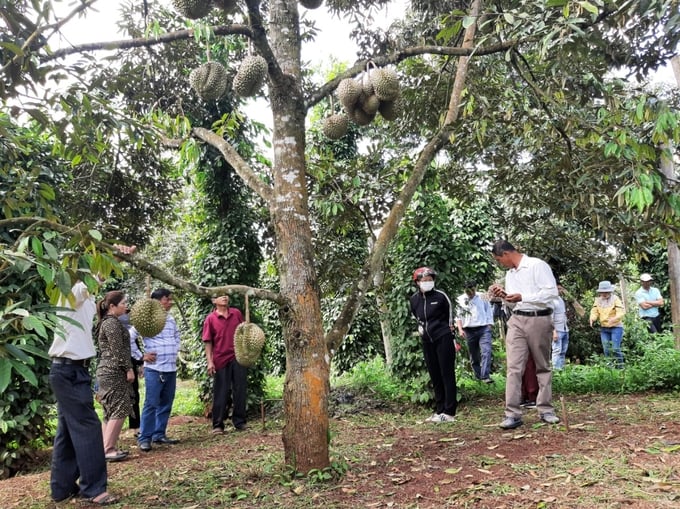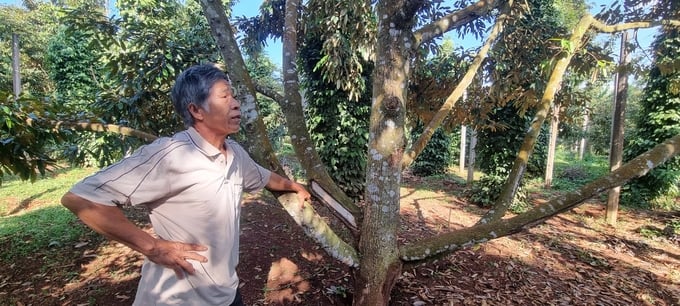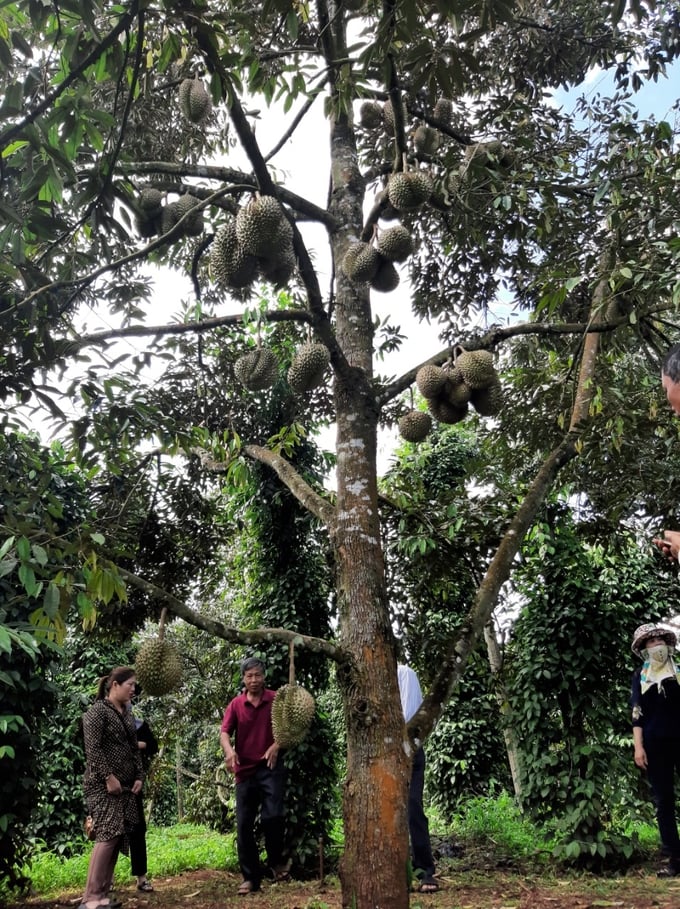May 29, 2025 | 12:26 GMT +7
May 29, 2025 | 12:26 GMT +7
Hotline: 0913.378.918
May 29, 2025 | 12:26 GMT +7
Hotline: 0913.378.918
A favorable, sustainable, and credible official durian export is the top priority of local authorities at all levels, the Agricultural sector, businesses, cooperatives and farmers growing durian in Gia Lai.

Gia Lai province's functional departments are supporting farmers to build brands and codes for Gia Lai durian growing areas.
Accordingly, planting areas that have been granted a code must comply with the regulations as well as the import market. The most important matter for the immediate future is maintaining the area after the planting area code has been issued. Additionally, stakeholders need to continue to expand the area to establish new planting area codes. If the planting area code is mismanaged, businesses can take advantage of exporting in excess of the allowed quantity, or mix in goods of unknown origin to export. If the importing country conducts post-inspection and detects fraudulent activities, the issued planting area code will be deleted. "Therefore, in addition to the standard production efforts from farmers and cooperatives, the authorities need to have a drastic control over thisproblem", said Mr. Nguyen Minh Tu - Vice Chairman of Chu Puh District People's Committee.
In addition to establishing planting areas, strictly complying with regulations when being granted planting area codes, etc., the branding of Gia Lai durian products is being promoted by local authorities and related industries.
Mr. Nguyen Nam Hai - Director of Gia Lai province Department of Science and Technology, commented: "Some products after registrating for a brand name have benefited from advantages in production and business activities such as higher selling prices, expanded market range. Several products have made initial impression on consumers such as Krong Pa beef, Ba Cham Mang Yang rice, Chu Se pepper, Gia Lai dried pho among many others. This is the driving force for the province to continue to protect the intellectual property rights for their key local agricultural products, with the ultimate goal of improving production and business efficiency, promoting the potential for development of local resources, and improving community life.
According to Mr. Hai, in order to ensure credibility, quality as well as to enhance competitiveness and affirming the superiority of Gia Lai durian specialties, the Department will coordinate with different localities to promote the registration of intellectual property rights for this durian product. Key agricultural products that have been protected by industrial property rights has greater advantages, creating highly sustainable trademarks.

Farmers in Gia Lai are complying with regulations to be allowed for official export.
Ia Mo Nong Cooperative for Production, Trade, Tourism and Agriculture in Ia Mo Nong commune, Chu Pah district currently has 220 hectares of durian belonging to 200 member households. 40% of this area has been harvested. Due to the low age of the tree, when the first crop was harvested, the yield was only 16 tons/hectare. However, according to Mr. Le Van Thanh - Director of the cooperative, these are quality assured farms. Because these are newly cultivated farms, the selection of durian varieties is restricted to mainly good varieties with resistant to diseases, high yield and delicious fruit quality such as Ri6, Dona. In addition, these farms are cultivated and cared for in accordance with the technical process, with technological advances applied. The cooperative is currently focusing on building to finalize 2 area codes for over 200 hectares of durian to be exported through official channels to China.
Mr. Le Van Thanh - Director of the cooperative said that: There are currently many Chinese businesses looking to buy durian, so the main goal of the cooperative will be to move towards this potential export market. “To achieve such feat, we have to fulfill all the requirements including planting area codes, geographical indications, traceability, etc. However, for sustainable durian exports, it is necessary to cooperate with local governments, the agricultural sector and meet the standards required by the importing country. The cooperative has signed a contract with the Nafoods Group Joint Stock Company to link durian consumption and develop the planting area code for durian trees", Mr. Thanh shared.

Thanks to the suitable climate and soil conditions, durian yield in Gia Lai is very favorable.
Nafoods Group Joint Stock Company built a 10 hectares passion fruit and durian processing factory in An Phu commune, Pleiku city. For durian fruit, the company purchases more than 20 thousand tons of raw materials every year. The Company has recently signed a contract with Ia Mo Nong Cooperative for Production, Trade, Tourism and Agriculture in the association of durian product consumption as well as building, completing the criteria for applying for a planting area code. The company will continue to associate with farms, agricultural associations, cooperative groups and cooperatives in the province to produce durian according to the value chain, and establish planting area codes. “Nafoods Group is one of the leading businesses in Vietnam in developing agricultural value chains and exporting fruit juices, frozen vegetables, dried fruits, nuts and fresh fruits. With the association of export durian production, we hope that Gia Lai durian products will be available in many countries around the world in the future”, emphasized Mr. Tran Duc Nhan, Head of Planting Area Development under Nafoods Group.
Mr. Doan Ngoc Co - Deputy Director of Gia Lai Department of Agriculture and Rural Development said: One of the standards for exporting durians to the Chinese market is to develop the planting area code and packageing facility code. Two important criteria for the Chinese market are pesticide residues and pests on durian fruit. Therefore, in order to export durian sustainably, farmers and cooperatives need to strictly comply with the standards set by the Chinese government.
“The new import permitting protocol is a necessary and a sufficient condition to ensure quality production. This task must be done synchronously from the organizing production stage to collecting, preserving, preliminarily processing and processing ", Mr. Co informed.
Translated by Nguyen Hai Long

(VAN) FAO’s Director-General addresses the 5th Baghdad International Water Conference.
/2025/05/26/1716-4-nongnghiep-191706.jpg)
(VAN) Chain linkages, technological innovation, and raw material zoning are three strategic pillars for the coconut industry to strongly develop and elevate its position on the global agricultural map.
![Advanced mariculture – an inevitable trend: [4] Accompanied by scientists](https://t.ex-cdn.com/nongnghiepmoitruong.vn/608w/files/sohk/2025/05/13/1941-pgsts-vo-van-nha-140958_717.jpg)
(VAN) According to Assoc. Prof. Dr. Vo Van Nha, Director of the RIA III, the development of advanced offshore mariculture is no longer an option but an essential path for Vietnam’s fisheries sector.

(VAN) Vietnam is intensifying the development of mollusk farming areas that meet international standards, aiming for sustainable growth and enhancing its export position in the global seafood market.
![Advanced mariculture – an inevitable trend: [3] Policy-driven momentum](https://t.ex-cdn.com/nongnghiepmoitruong.vn/608w/files/doanhtq/2025/05/21/0104-0616-0348-nuoi-bien-170339_789.jpg)
(VAN) To ensure the success of offshore mariculture that uses advanced technologies, it is essential to establish supportive policies that inspire both individuals and enterprises to invest with confidence.
![Advanced mariculture – an inevitable trend: [2] Outstanding results](https://t.ex-cdn.com/nongnghiepmoitruong.vn/608w/files/sohk/2025/05/12/4632-4136-nuoi-bien-11-164117_819.jpg)
(VAN) Pilot models of high-tech offshore mariculture in Vietnam, particularly in the South Central Coast region, have demonstrated exceptional economic returns and sustainability, setting a new direction for the country’s aquaculture industry.
![Advanced mariculture – an inevitable trend: [1] Moving offshore](https://t.ex-cdn.com/nongnghiepmoitruong.vn/608w/files/phucpm/2025/05/18/0252-2436-nuoi-bien-6-162148_783.jpg)
(VAN) Mariculture using advanced technology and moving offshore is an inevitable trend, as nearshore areas increasingly reveal limitations.